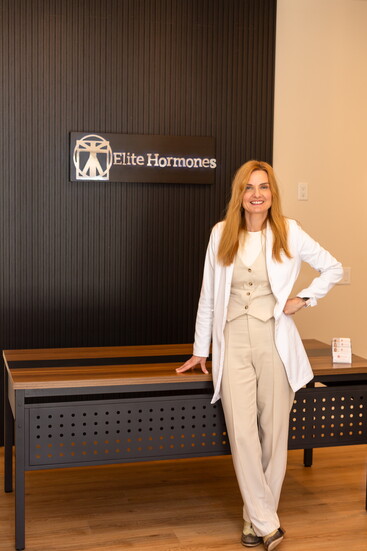What is the story behind Elite Hormones?
“Elite Hormones was born from a passion for helping people feel like themselves again. After working in healthcare and seeing how many individuals, especially men, were silently struggling with fatigue, weight gain, decreased sexual health, and brain fog, I realized there was a major gap in how hormone-related issues were being addressed. Most were dismissed as “normal aging” or met with one-size-fits-all solutions. I knew there had to be a better way.
I started Elite Hormones to offer personalized, science-backed hormone replacement therapy and wellness services that help men and women take back control of their health, not just to feel okay, but to feel young again.”
How do hormones impact energy, mood, weight, etc in men?
“Hormones, particularly testosterone, play a crucial role in nearly every system in the male body. When levels drop due to aging, stress, or other factors, men may experience low energy, depressed mood, poor concentration, difficulty building or maintaining muscle, increased belly fat, and diminished sexual health. Imbalances can also negatively affect sleep and motivation.
By restoring testosterone to optimal levels, we see dramatic improvements in energy, mood, strength, confidence, and quality of life.”
What are common misconceptions about men's hormonal therapy?
“One of the biggest misconceptions is that testosterone therapy causes prostate cancer or heart disease. Research shows that optimized hormone levels are linked to better cardiovascular and metabolic health.
Another is that testosterone is only for bodybuilders or older men. In reality, men of all ages can suffer from low testosterone, and therapy isn’t about getting "jacked"—it’s about restoring balance so they can feel their best.
We also hear concerns about fertility. While traditional testosterone therapy can have an effect on sexual health, there are alternative strategies, such as gonadorelin or enclomiphene, that preserve fertility while improving testosterone levels.“
What is the process of TRT?
“To understand the full picture of their hormonal and overall health, we start with comprehensive lab work. Once labs are completed, we schedule an in-person office visit to review the results, discuss symptoms and goals, and begin treatment—all in the same appointment.
Many of our patients travel a significant distance to see us, so we prioritize convenience without compromising quality. By having labs drawn ahead of time, we can ensure that patients receive a personalized treatment plan and get started right away on testosterone therapy—whether that’s injections, topical creams, or pellet therapy.
Follow-up labs and regular check-ins help fine-tune dosing and monitor key markers like estrogen levels and red blood cell count, ensuring optimal and safe results.
TRT isn’t a quick fix—it’s a guided, long-term approach to feeling your best.”
How do you personalize treatment plans for each patient?
“Everybody is different, so cookie-cutter hormone therapy doesn’t work. We look beyond basic labs and consider lifestyle, sleep, stress, nutrition, fitness level, and symptoms. Some patients thrive on injections, while others prefer the convenience of pellets or topicals. We also consider estrogen balance, thyroid health, and additional needs like growth hormone optimization or sexual health support.
Treatment is tailored to each individual, and we adjust as needed based on how the patient feels, not just what the labs say.”
Are there lifestyle changes you recommend alongside treatment?
“Absolutely. Hormone therapy is powerful, but it works best when paired with healthy habits. We encourage strength training, whole-food nutrition, stress management, sleep, and minimizing alcohol, which amplify the benefits of therapy and improve long-term outcomes.
Our patients feel so much better after starting treatment that they naturally begin to move more, eat better, and invest in their health. It creates a positive feedback loop.”
Where do you see hormone optimization heading in the next 5–10 years?
“I believe hormone optimization will become a cornerstone of preventative medicine. As research evolves, we’re witnessing how hormones impact heart health, cognitive function, and mental health.
In the next decade, I expect we’ll see broader acceptance of TRT, more advanced delivery systems, and a shift toward proactive care—treating root causes rather than symptoms. Personalized medicine, using genetics and precision lab work, will play a bigger role in tailoring care to the individual.
The future of men’s health is about empowerment—and we’re proud to be part of that movement.”
I started Elite Hormones to help men and women take back control of their health, not just to feel okay, but to feel young again.
Our patients feel so much better after starting treatment that they naturally begin to move more, eat better, and invest in their health, which amplify the benefits of therapy and improve long-term outcomes. It creates a positive feedback loop.
